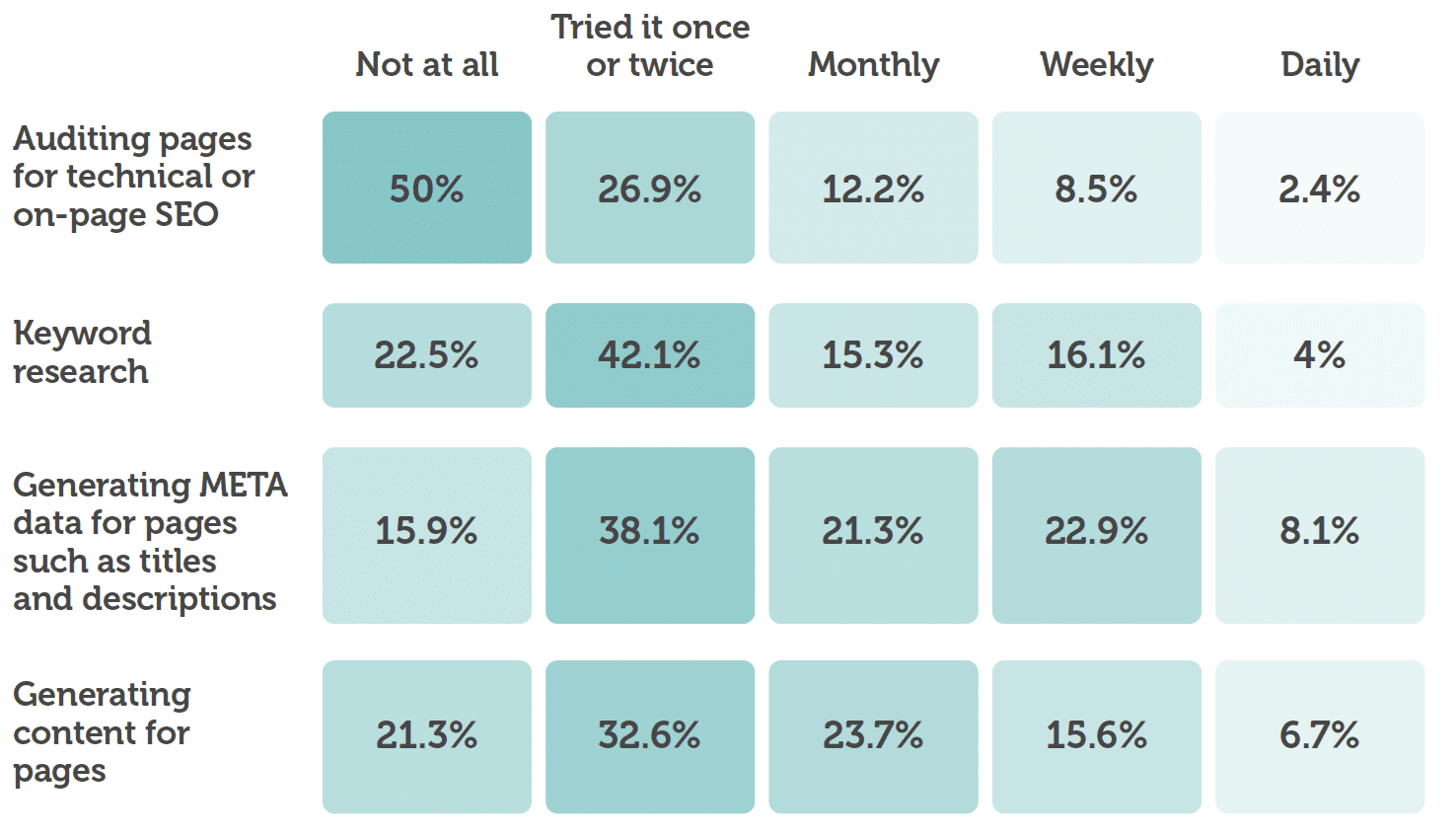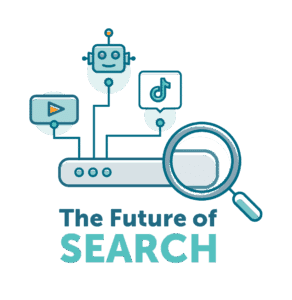How often do you use AI or ML tools to assist with the following SEO tasks?
We were keen to understand how technical SEOs are using AI and ML tools in their day-to-day work.
Generating META data is generally the most popular use case for AI and ML tools, followed by generating content for pages. It’s used least for auditing pages and keyword research.

What the experts think…
While currently the majority of AI tool use within the SEO community is around content applications, investments and roadmaps within the tooling community suggest that we're only a year or 2 out from widespread use of AI insights on audit data.
Will these results be different in a few months or even today after the recent core updates? Likely yes. Particularly when it comes to generating content. It's also interesting but not surprising how many SEOs are using AI for keyword research. That's the other danger area - it points to the need for us to better understand how these tools actually work before we decide to use them for client work. For example, traffic volume estimates seem far less reliable and clustering keywords using LMs does actually take into consideration the SERP overlap.
I don't think AI can be relied on for technical SEO auditing - it's such a nuanced area that can really benefit from human element of understanding the history of the site and how it works. But, it's great to see that SEOs have adopted AI for metadata creation - such a great way to scale up optimisation with no extra resources needed.
It's interesting that that technical auditing doesn't include as much AI as other methods such as Keyword research and generating meta. I think this is because the skill required to diagnose and troubleshoot issues, with so many nuances is something that AI currently can't do.
Do you believe that ChatGPT as a standalone tool is a threat to Google search?
The vast majority of SEOs (85%) said that they don’t believe that ChatGPT will be a threat to Google Search.
What the experts think…
Google Search is too robust of an ecosystem to be supplanted by ChatGPT. Plus, we're seeing evidence that searchers really do want to gather information from a variety of sources rather than receiving one concise answer to a query.
As much as I'm trying to be open to new technology, I really don't see it as a threat. As lazy as humans can be, I don't see most being comfortable with being given an answer without proper sources or the ability to read or explore a website further. While media literacy desperately needs to improve in this age of disinformation, I still the majority as knowing not to blindly trust an AI-generated answer and preferring to have more control over the search process.
I have a few thoughts on this, but I definitely fall into the second category here.
I think ChatGPT's knowledge restrictions pose a significant blocker to it becoming a threat to Google. Recency and unique perspectives are both crucial for most Google search users, and ChatGPT fails to deliver this in the same way.
I also believe that their use cases and outputs (pre-SGE) are different enough to distinguish the two tools and their use cases.
That said, it would be foolish not to recognize that ChatGPT offers a better experience for certain types of queries, and Google does stand to lose traction for those. This is similar to how TikTok has become a more suitable platform for certain queries.
Are you worried about the impact of Google Search Generative Experience (SGE) on regular organic search results?
When it comes to the introduction of Search Generative Experience by Google, 70% of SEOs said that they were worried about the impact of it on organic search.
What the experts think…
I'd love to meet the 30% of SEOs who are not worried at all. It must be nice! While there is no need for panic, we've seen voice search come in before on the panic train and we're still here, the fact is search is changing. We don't know what the "final" product will look like. But a nice dose of worry this time around seems prudent.
We've seen for a long time the increase of SERPs that encourage users to stay on Google, SGE is only another extension that.
The key will be continuing to optimise content for AI search engines as well as traditional ones like Google and Bing.
As humans, we tend to be worried about the unknown - who knows how SGE will impact organic search? We can only speculate for now and test where possible.
Yes, but exactly how worried I am keeps changing. There's still so much uncertainty about exactly how this will roll out, and I want to see how everyday users react to it as well. So much of the commentary has been from early adopters in the tech and SEO community and we're not exactly representative of how the rest of the world will use this.
I believe the Search Generative Experience (SGE) is going to immediately tank click-through rates if it is rolled out to all SERPs. When I'm using it, position 1 is regularly a full scroll down the page beneath both ads and Google SGE. As Google continues to roll out more features like this, securing SERP real estate will become increasingly difficult.
I've read lots of articles about how SGE is predicted to impact traffic, and this anxiety about zero click SERPs isn't a new thing. SEOs had similar concerns when knowledge panels were introduced. But that doesn't make it any less worrying.
One thing I'd say is that Google will inevitably face some challenges with SGE implementation, so we can't make too many assumptions about the fate of the SERP just yet.
My advice would be to manage up and communicate the future changes (and their potential impact) to stakeholders early on based on the information we do have. You should also consider how you can diversify distribution to increase yield from the same content if SGE does push yours further below the fold.
According to the data I've observed across multiple businesses, the impact of Google's Search Generative Experience (SGE) on organic search seems minimal thus far. While it may influence searches for a very naive audience, particularly for informational intents, I believe for businesses targeting a more mature audience, the impact appears to be negligible.
Do you believe that Bing has the ability to take away search market share from Google with their integration of ChatGPT?
On a similar note, we asked SEOs whether Bing can take away market share from Google with the integration of ChatGPT. More SEOs felt that Bing could do this than ChatGPT on it’s own, with 30% saying that they could take away market share from Google.
What the experts think…
A lot will be riding on SGE and how efficiently (and effectively) it's launched and adopted in different markets. Although Google is ahead of the game with integrating NLP and LLM in search, I think the playing field will even out more and more as the technology becomes more available to all.
